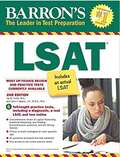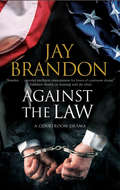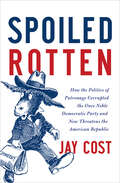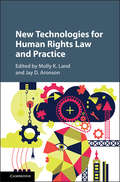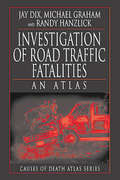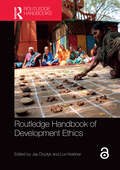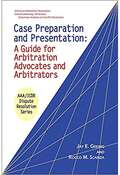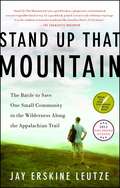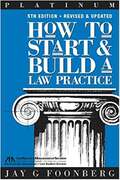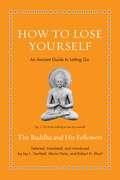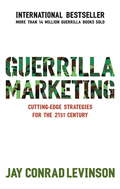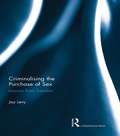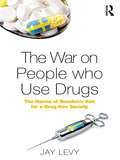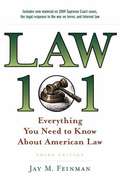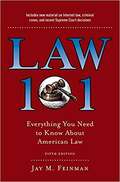- Table View
- List View
Forensic Science: The Basics (2nd Edition)
by Jay A. Siegel Kathy MirakovitsForensic Science: The Basics takes students through the criminal justice and forensic science systems from crime scene to court. It builds a solid foundation of tools such as microscopy, spectroscopy, and separation sciences and then applies them to the analysis of both the familiar types of evidence such as DNA, drugs, and trace evidence, but still covers the not so commonly studied "-ologies"--pathology, anthropology, odontology, and entomology.
LSAT: With Online Tests
by Jay B. Cutts John F. MaresThis must-have review book thoroughly prepares law school candidates for the all-important Law School Admission Test. <p><p>An introductory chapter explains the LSAT's format, suggests a detailed three-month study plan for success, and presents a diagnostic test with explained answers. Chapters that follow explain and review each of the LSAT's sections: Logical Reasoning, Reading Comprehension, and Analytical Reasoning. <p><p> The LSAT EssayEach chapter includes study tips, strategies for understanding and correctly answering the questions, critical strategies for controlling time, and a sample test with explained answers. All tests contain answer keys and through answer explanations. <p><p>BONUS ONLINE TESTS:Test takers who purchase this book will get access to two additional online practice LSATs with timed test sections, explained answers, and automated scoring. Those who purchase the book will also have access to online explanations for a second actual LSAT exam.
Against the Law: A Courtroom Drama
by Jay BrandonIntroducing lawyer-turned-ex-con Edward Hall—from the &“the finest writer of legal thrillers in the country&” (Jeremiah Healy, bestselling author of the John Cuddy mysteries). Fresh out of prison, former lawyer Edward Hall thinks his days in the courtroom are behind him. Until his sister, Dr Amy Hall, is arrested for murder . . . She&’s been accused of shooting the ex-husband she supposedly reconciled with and is convinced that her ex-convict brother is the only one able to save her. To make matters worse, the media won&’t ignore Amy&’s high-profile case; an example needs to be made of a doctor murdering another doctor. So Edward promises to do everything he can to protect his sister, because she is innocent, isn&’t she? Edward finds himself back in the courtroom facing Cynthia, the judge responsible for his arrest and imprisonment all those years ago. With personal grudges heavy in the air, can Edward spare his sister from a brutal sentencing that could cost her her life? &“Brandon, a Texas criminal lawyer, knows how to ratchet up tension in the courtroom.&”—Publishers Weekly &“A fine, tense legal thriller with an offbeat plot.&”—Booklist Praise for Jay Brandon &“Jay Brandon knows how to put together a tight, believable courtroom melodrama.&”—Entertainment Weekly &“Brandon is among the best in the legal-thriller business at catching the real atmosphere of a trial.&”—Publishers Weekly
Spoiled Rotten: How the Politics of Patronage Corrupted the Once Noble Democratic Party and Now Threatens the American Republic
by Jay CostA popular columnist for The Weekly Standard, conservative journalist Jay Cost now offers a lively, candid, diligently researched revisionist history of the Democratic Party. In Spoiled Rotten, Cost reveals that the national political organization, first formed by Andrew Jackson in 1824, that has always prided itself as the party of the poor, the working class, the little guy is anything but that—rather, it’s a corrupt tool of special interest groups that feed off of the federal government. A remarkable book that belongs on every politically aware American’s bookshelf next to Jonah Goldberg’s Liberal Fascism and The Forgotten Man by Amity Shlaes, Spoiled Rotten exposes the Democratic Party as a modern-day national Tammany Hall and indisputably demonstrates why it can no longer be trusted with the power of government.
Justified: A sultry, enemy-to-lovers romance that will leave you desperate for more! (Loveless)
by Jay Crownover'With a red-hot hero and emotional, unforgettable storyline, Crownover delivers the goods' Lori Wilde, New York Times bestselling authorFrom the New York Times bestselling author of the Marked Men series comes Jay Crownover's latest steamy Texan romance. Will Case and Aspen find their happy ending or are some grudges too much to overcome...'This tense, sensual romance is chock full of headstrong, admirable characters who will appeal to romance and suspense fans alike' Publishers WeeklyThe last thing Case Lawton wants to do is help the woman who cost him everything, but maybe Aspen isn't the heartless lawyer he thought he knew...Case Lawton comes from a family of criminals. So as the sheriff of Loveless, Texas, he's determined to do everything by the book - until he's called to Aspen Barlow's office after a so-called break-in. Although he's uninterested in helping the lawyer who caused him to lose custody of his son, Case is surprised by the Aspen he finds there, and starts to question his long-held grudge...Aspen is scared for her life, and Case is her last hope for protection. But she knows that to get him on her side, she'll have to reveal the painful truth from all those years ago. Now, as they work together to track down a dangerous criminal, Case and Aspen have to learn to trust each other. And as the threats escalate, it becomes clear there's a thin line between love and hate... and soon there's nothing Case wouldn't do to keep her safe...Includes It's All About That Cowboy, a bonus novella by Carly Bloom!Readers are loving Jay Crownover's latest!'A sultry, action-packed, wonderful addition to the Loveless, Texas series by Crownover that keeps you on your toes from start to finish, warms the heart, and definitely leaves you yearning for more' 5* reader review'Pairing an angsty, steamy enemies-to-lovers romance with a twisty, turny suspense arc, Justified was a riveting love story....Justified is Jay Crownover at the top of her game' 5* reader review'Justified is absolutely everything I love about Jay Crownover! Strong characters, some intrigue, some mystery, and a whole lot of sexiness make for a book I just did not want to put down!' 5* reader reviewFilled with heart, intrigue and cast of characters you'll fall for, don't miss out on the other titles in the Loveless, Texas series! Praise for Jay Crownover and the Loveless, Texas series:'I'm in love with Loveless, TX!!' 5* reader review'I always recommend any books written by Jay Crownover' 5* reader review'I've never read a Jay Crownover book that I have not loved' 5* reader review'Off the charts attraction, dramatic suspense, heartbreaking betrayal, deep emotion, and unforgettable romance will keep you turning the pages to the climactic end. Fans and new readers will devour this fantastic story. I couldn't put it down!' Jennifer Ryan, New York Times bestselling author'Once again, Jay Crownover proves why her words are so addictive! Her characters bleed life so tangibly, you feel like you're drowning in the emotions: in the best way possible. Five big huge stars for Justified! Don't miss this page turner!' Harper Sloan, New York Times bestselling author
Justified: A sultry, enemy-to-lovers romance that will leave you desperate for more! (Loveless)
by Jay CrownoverFrom the New York Times bestselling author of the Marked Men series comes an irresistible and thrilling romance between a rugged Texas sheriff and the woman who was once his sworn enemy...Case Lawton comes from a family of criminals. So as the sheriff of Loveless, Texas, he's determined to do everything by the book - until he's called to Aspen Barlow's office after a so-called break-in. The last thing he wants to do is help the woman who cost him custody of his son. But Aspen isn't the heartless lawyer Case remembers, and he starts to question his long-held grudge...Aspen is scared for her life, and Case is her last hope for protection. But to get him on her side, she'll have to reveal the painful truth from all those years ago. Now, as they work together to track down a dangerous criminal, Case and Aspen learn to trust each other. And as the threats escalate, it becomes clear there's a thin line between love and hate... because there's nothing Case wouldn't do to keep her safe.(P)2019 Hachette Audio
New Technologies for Human Rights Law and Practice
by Jay D. Aronson Molly K. LandNew technological innovations offer significant opportunities to promote and protect human rights. At the same time, they also pose undeniable risks. In some areas, they may even be changing what we mean by human rights. The fact that new technologies are often privately controlled raises further questions about accountability and transparency and the role of human rights in regulating these actors. This volume – edited by Molly K. Land and Jay D. Aronson – provides an essential roadmap for understanding the relationship between technology and human rights law and practice. It offers cutting-edge analysis and practical strategies in contexts as diverse as autonomous lethal weapons, climate change technology, the Internet and social media, and water meters. This title is also available as Open Access.
Who Owns the Dead?
by Jay D. AronsonAfter the 9/11 attack on the World Trade Center, Chief Medical Examiner Charles Hirsch proclaimed that his staff would do more than confirm the victims' identity. They would attempt to return to families every human body part larger than a thumbnail. As Jay D. Aronson shows, delivering on that promise proved to be a monumentally difficult task.
Asphyxia and Drowning: An Atlas (Cause of Death Atlas Series)
by Jay Dix Michael Graham Randy HanzlickThis third volume in the Forensic Pathology Atlases: Causes of Death Series provides an overview of the types, mechanisms, and physical findings associated with deaths involving asphyxia. Asphyxia and Drowning serves as a basic framework for an extensive pictorial representation of findings associated with these types of deaths. It helps the reader
Guide to Forensic Pathology
by Jay DixGuide to Forensic Pathology provides a concise overview of forensic pathology to those who wish to know the basics but lack formal forensic training. Both fascinating and practical, this book explains everything from who the experts are in death investigation and what their roles are to how effective testimonies are presented in court. The importance of forensic DNA testing is emphasized with a separate section in this timely reference guide.
Handbook for Death Scene Investigators
by Jay DixHandbook for Death Scene Investigators provides concise information in a handy, pocket-sized (3 1/2" x 6") format - perfect for on-the-scene reference.Details about sudden natural deaths by disease and accidents are emphasized in this guidebook, complemented with practical information on:reviewing a medical chartcollecting evidenceobtaining a medic
Investigation of Road Traffic Fatalities: An Atlas (Cause of Death Atlas Series)
by Jay Dix Michael Graham Randy HanzlickThe screech of rubber against asphalt. And then the crash: a violent two-car collision resulting in a twisted mass of metal, plastic, and glass-and worse, the deaths of both drivers.Accident reconstruction is but one phase of road traffic fatality (RTF) cases. Even as police officers draw their last diagram, interview their last witness, and recons
No Angel: My Harrowing Undercover Journey to the Inner Circle of the Hells Angels
by Jay Dobyns Nils Johnson-SheltonHere, from Jay Dobyns, the first federal agent to infiltrate the inner circle of the outlaw Hells Angels Motorcycle Club, is the inside story of the twenty-one-month operation that almost cost him his family, his sanity, and his life.Getting shot in the chest as a rookie agent, bartering for machine guns, throttling down the highway at 100 mph, and responding to a full-scale, bloody riot between the Hells Angels and their rivals, the Mongols–these are just a few of the high-adrenaline experiences Dobyns recounts in this action-packed, hard-to-imagine-but-true story.Dobyns leaves no stone of his harrowing journey unturned. At runs and clubhouses, between rides and riots, Dobyns befriends bad-ass bikers, meth-fueled “old ladies,” gun fetishists, psycho-killer ex-cons, and even some of the “Filthy Few”–the elite of the Hells Angels who’ve committed extreme violence on behalf of their club. Eventually, at parties staged behind heavily armed security, he meets legendary club members such as Chuck Zito, Johnny Angel, and the godfather of all bikers, Ralph “Sonny” Barger. To blend in with them, he gets full-arm ink; to win their respect, he vows to prove himself a stone-cold killer.Hardest of all is leading a double life, which has him torn between his devotion to his wife and children, and his pledge to become the first federal agent ever to be “fully patched” into the Angels’ near-impregnable ranks. His act is so convincing that he comes within a hairsbreadth of losing himself. Eventually, he realizes that just as he’s been infiltrating the Hells Angels, they’ve been infiltrating him. And just as they’re not all bad, he’s not all good.Reminiscent of Donnie Brasco’s uncovering of the true Mafia, this is an eye-opening portrait of the world of bikers–the most in-depth since Hunter Thompson’s seminal work–one that fully describes the seductive lure criminal camaraderie has for men who would otherwise be powerless outsiders. Here is all the nihilism, hate, and intimidation, but also the freedom–and, yes, brotherhood–of the only truly American form of organized crime.From the Hardcover edition.
Routledge Handbook of Development Ethics
by Lori Keleher Jay DrydykThe Routledge Handbook of Development Ethics provides readers with insight into the central questions of development ethics, the main approaches to answering them, and areas for future research. Over the past seventy years, it has been argued and increasingly accepted that worthwhile development cannot be reduced to economic growth. Rather, a number of other goals must be realised: • Enhancement of people's well-being • Equitable sharing in benefits of development • Empowerment to participate freely in development • Environmental sustainability • Promotion of human rights • Promotion of cultural freedom, consistent with human rights • Responsible conduct, including integrity over corruption Agreement that these are essential goals has also been accompanied by disagreements about how to conceptualize or apply them in different cases or contexts. Using these seven goals as an organizing principle, this handbook presents different approaches to achieving each one, drawing on academic literature, policy documents and practitioner experience. This international and multi-disciplinary handbook will be of great interest to development policy makers and program workers, students and scholars in development studies, public policy, international studies, applied ethics and other related disciplines.
Case Preparation and Presentation: Guide for Arbitration Advocates and Arbitrators
by Jay E. Grenig Rocco M. ScanzaArbitration advocates uniformly place great emphasis on case preparation. Case Preparation and Presentation: A Guide for Arbitration Advocates and Arbitrators can be used to help prepare parties and their advocates in a wide range of arbitration cases including labor, employment and commercial arbitrations and will provide lawyers and non-lawyers alike with the focus and direction to maximize their chances of obtaining a good result in arbitration. <p><p> In this book readers will find coverage on the following topics: Developing a case theory and case theme Commencing the arbitration process Selecting an arbitrator and scheduling the hearing Evaluating and presenting evidence Preparing for the arbitration hearing Conducting the arbitration hearing Making and responding to objections Examination and cross-examination of witnesses
Stand Up That Mountain
by Jay Erskine LeutzeIn the tradition of A Civil Ac tion--the true story of a North Carolina outdoorsman who teams up with his Appalachian "mountain people" neighbors to save treasured land from being destroyed Living alone in his wooded mountain retreat, Jay Leutze gets a call from a whip-smart fourteen-year-old, Ashley Cook, and her aunt, Ollie Cox, who say a mining company is intent on tearing down Belview Mountain, the towering peak above their house. Ashley and her family, who live in a little spot known locally as Dog Town, are "mountain people," with a way of life and speech unique to their home high in the Appalachians. They suspect the mining company is violating the law, and they want Jay, a nonpracticing attorney, to stop the destruction of the mountain. Jay, a devoted naturalist and fisherman, quickly decides to join their cause. So begins the epic quest of the "Dog Town Bunch," a battle that involves fiery public hearings, clandestine surveillance of the mine operator's activities, ferocious pressure on public officials, and high-stakes legal brinksmanship in the North Carolina court system. Jay helps assemble a talented group of environmental lawyers to do battle with the well-funded attorneys protecting the mining company's plan to dynamite Belview Mountain, which happens to sit next to the famous Appalachian Trail, the 2,184-mile national park that stretches from Maine to Georgia. As the mining company continues to level the forest and erect a gigantic rock-crushing plant on the site, Jay's group searches frantically for a way to stop an act of environmental desecration that will destroy a fragile wild place and mar the Appalachian Trail forever. Much more than the record of a legal battle, Stand Up That Mountain takes the reader to a remote corner of Appalachia, a region often stereotyped and little understood, even now in the twenty-first century. A naturally elegant writer, Jay Leutze delivers a powerful, beautifully written story full of remarkable characters, such as "Wingfoot," an elusive protector of the Appalachian Trail; a stubborn mining company engineer intent on pulling down the mountain in the face of intense opposition; and Ron Howell, a retired and legendary North Carolina Superior Court judge known as the "Heel Hound" for his relentless pursuit of legal victory. Jay's plaintiff group is eventually joined by several national conservation groups who see that Belview Mountain and the Appalachian Trail must be protected for future generations of Americans. A great contemporary story that demonstrates what is possible when local people set their minds to righting a local wrong, Stand Up That Mountain will appeal to conservationists, hikers, attorneys, and readers fascinated by Appalachia and rural life, and anyone interested in a compelling story both well told and true.
How to Startvand Build a Law Practice
by Jay FoonbergIf you have a question about starting and growing your own law practice, or improving your existing solo or small firm practice, Jay Foonberg has the answers in this power-packed, updated, and expanded new edition. <p><p>Learn it all from a practicing lawyer who provides you with real answers, for real practices, gained from real experiences. This classic ABA bestseller has been used by tens of thousands of lawyers as the comprehensive guide to planning, launching, and growing a successful practice. It’s packed with 769 pages of guidance on identifying the right location, finding clients, setting fees, managing your office, maintaining an ethical and responsible practice, maximizing available resources, upholding your standards, and much more. If you’re committed to starting your own practice, this book will give you the expert advice you need to make it succeed.<p><p>How the ABA’s #1 Bestseller Will Help YouThe book is organized into short, easy-to-read chapters and they deal with all the specific challenges you undoubtedly will encounter when you open your office. And the answers you’ll get are realistic, practical, and based on real-life experience. <p><p>Even if you already have an established practice, you are sure to find information that will help you compete and succeed. You’ll find a wealth of tips that can improve your practice once it is up and running, as well as dozens of time-saving templates and checklists. <p><p>In addition, there is all-new material for this edition, covering areas including: <ul><li>E-mail and the InternetLaw firm mergers and dissolutions</li> <li>Student loans</li> <li>Opportunities created by an aging population</li> <li>Nonlawyer consultants</li> <li>The globalization of legal practice, and much more! </li></ul> <p><p>This book is guaranteed to help you successfully launch your practice, run it at maximum efficiency, and avoid potential pitfalls along the way. You’ll get basic, practical advice given in Foonberg’s inimitable down-to-earth style–and answers to down-to-earth questions including: Where is the ideal place to open my office? How much cash do I need to start? How can I get cash up front to reduce bad debts?Should I charge for the first consultation? How do I spot the client who won’t pay? What kinds of equipment will I need–at a minimum–to start out?What are the most effective ways of getting clients?More than 100,000 lawyers have turned to Jay Foonberg for the secrets to running a successful law firm; now you can, too, with the acclaimed Sixth Edition.
How To Start and Build a Law Practice
by Jay G. FoonbergA classic ABA bestseller, How to Start and Build a Law Practice has been used by tens of thousands of lawyers as the comprehensive guide to planning, launching, and growing a successful practice. Author Jay G Foonberg, now in his fifth decade of practicing law, has always been dedicated to giving other lawyers the benefit of his wealth of experience. This Platinum Fifth Edition is packed with over 600 pages of guidance on identifying the right location, finding clients, setting fees, managing your office, maintaining an ethical and responsible practice, maximizing available resources, upholding your standards, and much more. If you’re committed to starting—and growing— your own practice, this one book will give you the expert advice you need to make it succeed. More than 100,000 lawyers have turned to Jay Foonberg for the secrets to running a successful law firm; now you can, too, with the new Platinum Fifth Edition. <P><P> Jay Foonberg has organized the book into short, easy-to-read chapters that deal with all the specific challenges you will encounter when you open your office. The answers you'll get are realistic, practical, and based on real-life experience. You’ll find a wealth of tips that can improve your practice once it is up and running, as well as dozens of time-saving templates and checklists. In addition, there is all-new material for this edition, covering topics including: <P><P> New opportunities for serving senior clients and the growth of elder law E-mail and the Internet Law firm mergers and dissolutions The increasing size of student loans Opportunities created by an aging population Nonlawyer consultants The globalization of legal practice When and how to safely close and destroy files The aggressive marketing being done now by firms of all sizes And much more! Even if you already have an established practice, you are sure to find information that will help you compete and succeed. This is the one book you’ll need to build and grow your practice.
Buddhist Ethics: A Philosophical Exploration (Buddhist Philosophy for Philosophers Series)
by Jay L. GarfieldBuddhist Ethics presents an outline of Buddhist ethical thought. It is not a defense of Buddhist approaches to ethics as opposed to any other, nor is it a critique of the Western tradition. <p><p>Garfield presents a broad overview of a range of Buddhist approaches to the question of moral philosophy. He draws on a variety of thinkers, reflecting the great diversity of this 2500-year-old tradition in philosophy but also the principles that tie them together. In particular, he engages with the literature that argues that Buddhist ethics is best understood as a species of virtue ethics, and with those who argue that it is best understood as consequentialist. Garfield argues that while there are important points of contact with these Western frameworks, Buddhist ethics is distinctive, and is a kind of moral phenomenology that is concerned with the ways in which we experience ourselves as agents and others as moral fellows.
How to Lose Yourself: An Ancient Guide to Letting Go (Ancient Wisdom for Modern Readers)
by Jay L. Garfield, Maria Heim, and Robert H. SharfInviting new translations of classical Buddhist texts about why the self is an illusion—and why giving it up can free us from sufferingFrom self-realization and self-promotion to self-help and the selfie, the modern world encourages us to be self-obsessed. We are even told that finding ourselves is the key to happiness. Better to lose yourself! More than 2,500 years ago, the Buddha argued that the self is an illusion—and that our belief in it is the cause of most, if not all, of our suffering. How to Lose Yourself presents lively, accessible, and expert new translations of ancient Buddhist writings about the central, unique, and powerful Buddhist teaching of &“no-self.&”Drawn from three important Buddhist traditions, these essential Indian, Tibetan, and Chinese writings provide a rich sampling of the ways Buddhist philosophers have understood the idea that we are selfless persons—and why this insight is so therapeutic. When we let go of the self, we are awakened to the presence of all things as they truly are, and we let go of the anxiety, fear, greed, and hatred that are the source of all suffering.Complete with an introduction and headnotes to each selection, and the original texts on facing pages, How to Lose Yourself is a concise guide to a transformative idea.
Guerrilla Marketing: Cutting-edge strategies for the 21st century
by Jay LevinsonThe book every small-business owner should ownFirst published in 1983, Jay Levinson's Guerrilla Marketing has become a classic in the field of business, revolutionising marketing for small businesses all over the world and creating a new way to understand market share and how to gain it. In this completely updated and expanded fourth edition of Levinson's first Guerrilla Marketing book, his take-no-prisoners approach to finding clients is on full display, as he offers hundreds of marketing ideas that really work and a new roadmap for small-business success in the global marketplace. Filled with leading-edge strategies for marketing on the Internet, putting new technologies to work, targeting prospects, cultivating repeat and referral business, and managing in the age of telecommuting and freelance employees, among others, Guerrilla Marketing will be the entrepreneur's marketing bible for the twenty-first century.
Criminalising the Purchase of Sex: Lessons from Sweden
by Jay LevyIn an attempt to abolish prostitution, Sweden criminalised the purchase of sex in 1999, while simultaneously decriminalising its sale. In so doing, it set itself apart from other European states, promoting itself as the pioneer of a radical approach to prostitution. What has come to be referred to as ‘the Swedish model’ has been enormously influential, and has since been adopted and proposed by other countries. This book establishes the outcomes of this law – and the law’s justifying narratives – for the dynamics of Swedish sex work, and upon the lives of sex workers. Drawing on recent fieldwork undertaken in Sweden over several years, including qualitative interviewing and participant observation, Jay Levy argues that far from being a law to be emulated, the Swedish model has had many detrimental impacts, and has failed to demonstrably decrease levels of prostitution. Criminalising the Purchase of Sex: Lessons from Sweden utilises a wealth of respondent testimony and secondary research to redress the current lack of primary academic research and to contribute to academic discussion on this politically-charged and internationally relevant topic. This original and timely work will be of interest to sex worker rights organisations, policy makers and politicians, as well as researchers, academics and students across a number of related disciplines, including law, sociology, criminology, human geography and gender studies.
The War on People who Use Drugs: The Harms of Sweden's Aim for a Drug-Free Society
by Jay LevyThis book explores the outcomes of Sweden’s aim to create a ‘drug-free society’ on the lived realities, health, and welfare of people who use drugs, and on the dynamics of Swedish drug use. Drawing on a wealth of empirical data, including extensive interview testimony and participant observation from years of fieldwork conducted in Sweden, the book debunks the widely-believed myth that Sweden is a progressive, liberal, inclusive state. In contrast to its liberal reputation, Sweden has criminalised the use of drugs and allows for compulsory treatment for those with drug dependencies. The work argues that Swedish law and policy cannot be demonstrated to have decreased drug use as intended, with the law used instead as a means with which to displace people who use drugs from public spaces in Sweden’s cities. And where the law has failed in its ambition to decrease drug use, Swedish law and policy have increased and exacerbated the problems, dangers, and harms that can be associated with it. People who use drugs in Sweden experience considerable and endemic difficulties with health, violence, abuse, and social exclusion, stigma, and discrimination as a result of Sweden’s drug laws, policies, and discourses.
Law 101: Everything You Need To Know About American Law
by Jay M. FeinmanLaw is everywhere. Every day, the news features a notorious criminal trial, a massive lawsuit, or a new constitutional claim. But it all seems so complicated. In a book brimming with legal puzzles, interesting anecdotes, thought-provoking questions, and intellectual stimulation, Jay M. Feinman offers a delightfully clear introduction to law, giving us a solid understanding of the American legal tradition, and covering the main subjects taught in the first year of law school. Readers are introduced to every aspect of the legal system, including constitutional law, the litigation process, personal injury law, contract law, property law, and criminal law. Feinman illuminates each discussion with many intriguing, outrageous, and infamous cases, from the sensational murder trial in Victorian London that led to the legal definition of insanity, to the epochal decision in Marbury v. Madison that gave the Supreme Court the power to declare state and federal laws unconstitutional, to theinfamous McDonald's hot coffee case. He broadens the reader's legal vocabulary, clarifying the meaning of everything from "due process" and "equal protection" in constitutional law, to the distinction between "murder" and "manslaughter" in criminal law. This third edition has been fully updated throughout, and incorporates the most recent developments in the American legal system, including new material on 2009 Supreme Court cases, the legal response to the war on terror (such as the Guantanamodetainees and electronic surveillance), and new and updated material on law on the Internet. Everyone who wants a better grasp of current legal issues, including ordinary citizens, students contemplating law school, and journalists covering the legislature or the courts, will find here a wonderful source of information - a complete, clear, and colorful map of the American legal system.
Law 101: Everything You Need To Know About American Law
by Jay M. FeinmanMost of us know very little about the law. We pick up bits of information from television and newspaper accounts of current legal battles, and from bestselling novels and popular movies. But these pieces do not give us an accurate or complete picture. In Law 101 , Jay M. Feinman offers a delightfully clear introduction to law, covering the main subjects found in the first year of law school and giving us a basic understanding of the American legal tradition. Readers are introduced to every aspect of the legal system, from constitutional law and the litigation process to tort law, contract law, property law, and criminal law. Feinman illuminates each discussion with many intriguing, outrageous, and infamous cases, from the scalding coffee case that cost McDonald's half a million dollars, to the sensational murder trial in Victorian London that led to the legal definition of insanity, to the epochal decision in Marbury v. Madison that gave the Supreme Court the power to declare state and federal laws unconstitutional. He broadens the reader's legal vocabulary, clarifying the meaning of everything from "due process" and "equal protection" in constitutional law, to the distinction between "murder" and "manslaughter" in criminal law. Perhaps most important, we learn that law is voluminous and complex, but accessible to everyone. Anyone who enjoys Court TV will find this book irresistible. Everyone who wants a better grasp of current legal issues, from students contemplating law school to journalists covering the legislature or the courts, will find here a wonderful source of information--a complete, clear, and colorful map of the American legal system.

